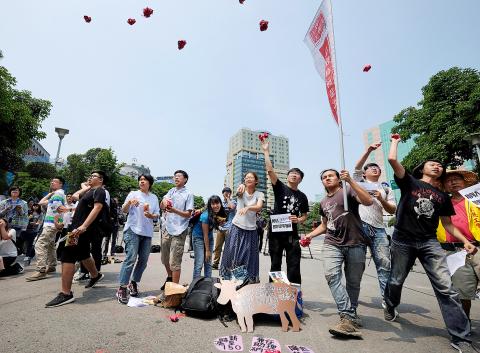A coalition of youth groups yesterday protested outside the Executive Yuan in Taipei, demanding that the government do more to improve salaries.
The Executive Yuan last week unveiled a series of measures to increase wages and attributed the problem of low wages in part to the increasing number of university graduates and migrant workers in recent years.
A dozen students from the Taiwan Higher Education Union, the Alliance Against the Commercialization of Education and other groups “bowed” and “apologized” before the Executive Yuan building, holding instant noodles — which they said were one of the few things they could afford.

Photo: CNA
“The Executive Yuan said the nation’s average monthly salary would have been NT$59,852 if migrant workers’ salaries were not included. That made us realize we have also been lowering the average salary, because we make less than NT$30,000 a month. We are very sorry for that,” said Tamkang University student Hsieh Yi-hung (謝毅弘), an alliance member.
As university students, they are also responsible for increasing the number of university graduates in the nation, which the Executive Yuan said was another cause of low wages, he added.
Although the Executive Yuan is planning to raise the hourly wage to NT$150, employers can still control personnel costs by hiring more full-time employees with a monthly minimum salary of NT$22,000, which has remained unchanged, he said.
“Considering how much consumer prices have increased in recent years, the government should raise the minimum monthly salary to NT$29,189 and the minimum hourly wage to NT$186,” he added.
As part of the plans to increase wages, the Ministry of Education earlier this month said that universities must apply for labor and health insurance for their teaching assistants, but the latter account for only 19 percent of all campus assistants, National Yang-ming University student Chu Chih-te (朱智德) said.
Others, such as research assistants, who might be exposed to greater occupational hazards when working in labs, should also have labor and health insurance, he said.
“Universities can easily avoid having to pay for labor and health insurance by hiring only research assistants and making them do the work of teaching assistants,” he said.
The only way to prevent that is to require schools to provide both types of insurance to all assistants, he said.
If the government really wants to help young people struggling with low wages, it should promise to freeze tuition for three years and increase its education budget by raising the capital gains tax, Shih Hsin University student Lee Jung-yu (李容渝) said.
“Many students have to pay their own tuition and living expenses, and that has made life very tough for them,” she said.
The protest concluded with students throwing paper balls into the Executive Yuan compound and posting a paper that listed their monthly earnings on the compound’s gate — which range from NT$13,000 to NT$30,000 a month.

Alain Robert, known as the "French Spider-Man," praised Alex Honnold as exceptionally well-prepared after the US climber completed a free solo ascent of Taipei 101 yesterday. Robert said Honnold's ascent of the 508m-tall skyscraper in just more than one-and-a-half hours without using safety ropes or equipment was a remarkable achievement. "This is my life," he said in an interview conducted in French, adding that he liked the feeling of being "on the edge of danger." The 63-year-old Frenchman climbed Taipei 101 using ropes in December 2004, taking about four hours to reach the top. On a one-to-10 scale of difficulty, Robert said Taipei 101

Nipah virus infection is to be officially listed as a category 5 notifiable infectious disease in Taiwan in March, while clinical treatment guidelines are being formulated, the Centers for Disease Control (CDC) said yesterday. With Nipah infections being reported in other countries and considering its relatively high fatality rate, the centers on Jan. 16 announced that it would be listed as a notifiable infectious disease to bolster the nation’s systematic early warning system and increase public awareness, the CDC said. Bangladesh reported four fatal cases last year in separate districts, with three linked to raw date palm sap consumption, CDC Epidemic Intelligence

Two Taiwanese prosecutors were questioned by Chinese security personnel at their hotel during a trip to China’s Henan Province this month, the Mainland Affairs Council (MAC) said yesterday. The officers had personal information on the prosecutors, including “when they were assigned to their posts, their work locations and job titles,” MAC Deputy Minister and spokesman Liang Wen-chieh (梁文傑) said. On top of asking about their agencies and positions, the officers also questioned the prosecutors about the Cross-Strait Joint Crime-Fighting and Judicial Mutual Assistance Agreement, a pact that serves as the framework for Taiwan-China cooperation on combating crime and providing judicial assistance, Liang

US climber Alex Honnold left Taiwan this morning a day after completing a free-solo ascent of Taipei 101, a feat that drew cheers from onlookers and gained widespread international attention. Honnold yesterday scaled the 101-story skyscraper without a rope or safety harness. The climb — the highest urban free-solo ascent ever attempted — took just more than 90 minutes and was streamed live on Netflix. It was covered by major international news outlets including CNN, the New York Times, the Guardian and the Wall Street Journal. As Honnold prepared to leave Taiwan today, he attracted a crowd when he and his wife, Sanni,